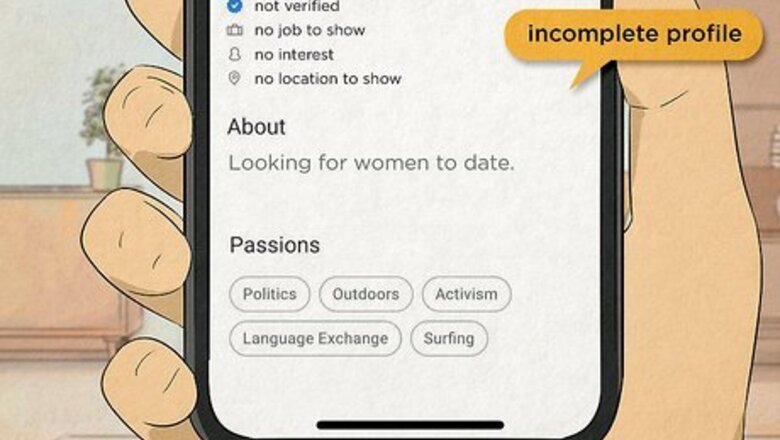
views
X
Research source
These profiles think they’re being clever, but you can avoid being catfished by watching out for suspicious signs. Pull out your magnifying glass and get ready to learn how to detect a fake dating profile.
They have blank sections in their profile.
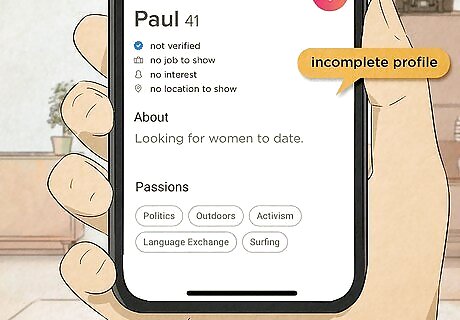
Lack of detail could be a sign of a fake profile. Most dating apps and sites ask you to fill out a questionnaire that’ll give more information about you on your profile. Fake profiles and scammers will most likely leave parts of their profiles blank, claiming they forgot to fill them in or didn’t have time to. If their name, age, and location are the only thing filled out, chances are they’re fake. Check to see if they’ve linked their social media accounts to the page. Real profiles tend to plug their Instagram or Snapchat in their bios.
They’ve only posted one photo.

Chances are they’re hiding something if they upload a single selfie. Fake profiles and romance scammers will try to make realistic-looking profiles with a seemingly harmless profile pic. If their one picture looks “too perfect” or staged, the profile is most likely fake. Fake profiles usually use pictures of headshots stolen from Google or stock photo websites. You can do a reverse search on the image to trace it. Start by right clicking on the image and saving it to your desktop. Then, go to Google Images and click “Search by image." Click “Upload an image," select the picture from your files, and run the search.
They don’t have many friends or followers.
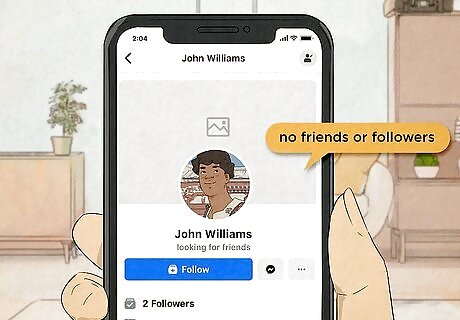
Fake profiles are made to catfish, so they won’t bother making friends. Look the person up on Instagram, Facebook, and Twitter. If they’re a fake dating profile, chances are they’re fake across all platforms. Do they have a good number of followers, or are they following an absurd amount of people? You can tell a profile is fake if the people following them don’t seem legit themselves. Notice if they have followers in common across all platforms. Friends usually follow friends on all social media. Check to see if they’re tagged in any of their followers' posts.
They say they’re in another country.
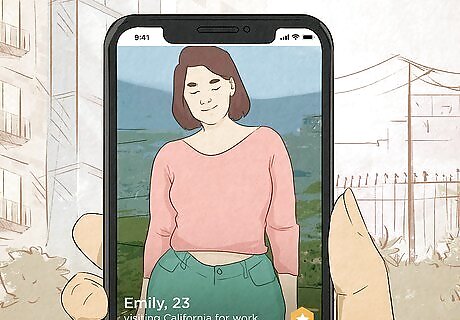
Claiming they’re stuck abroad is a common scam fake profiles use to get money. Maybe they say they’re on a business trip and don’t have enough money to get back home, or they can’t access their bank account in a different country. This is their way of guilting you into giving them money, and it’s a major red flag. Now, talking to someone from another country on a dating app or site isn’t bad! The beauty of online dating is you can meet people from anywhere. But if they repeatedly mention that they need your help, they’re trying to scam you.
They ask to chat off the dating app or site.
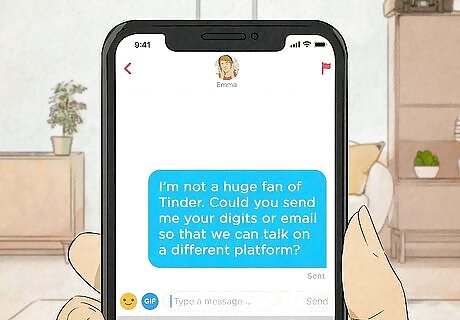
A scammer will want your personal email or phone number right away. They’ll skip the small talk on the dating app or site and try to get things moving on another platform. This is their way of getting past the dating app or site’s protocols while getting your personal information. Never give your email, phone number, or any other personal information to someone online. If they ask, simply tell them “no,” or move on and connect with a different profile.
Their messages have lots of errors.
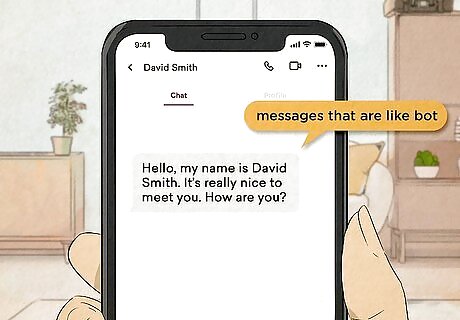
Fake profiles might be controlled by a bot or someone from another country. Grammatical and spelling errors will litter their profile and messages because of wacky code or from writing in a second language. It’s common for someone to make a grammatical mistake every once and a while, but these could be common occurrences for a fake profile. Think about what common errors you make when texting a friend. Is the person behind the profile making the same errors, or are theirs much worse? Look out for generic messages, too. They may send something like, “Hello, My name is…”
They send you links.
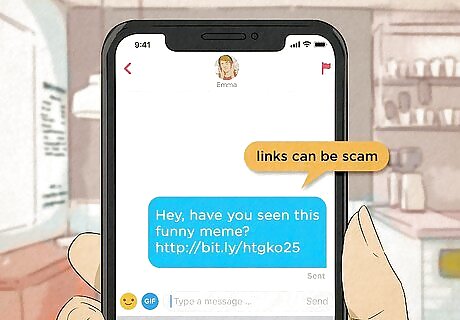
Links are a popular phishing scam, so don’t click on them. Perhaps they send a link asking you to take a look at their new website, or one they claim is a funny video. Links can easily be disguised to contain malware, spyware, and viruses, so think before you click. Ignore their message, or, better yet, try finding another profile to connect with. Virus scanners like Norton, Malwarebytes, and HouseCall can help you detect any threats in case you did click on an unknown link.
They ask for personal financial information.
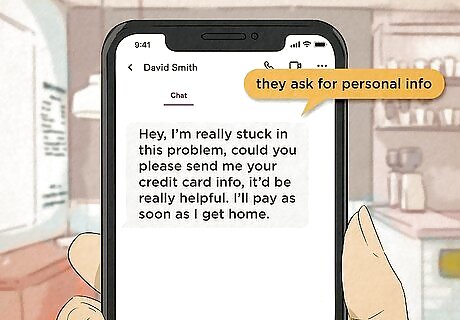
If they ask for your bank info or credit card number, they’re scamming you. Fake profiles will try to get your personal information as fast as possible. They’ll ask for your email, details about where you work, phone number, and surname. Getting information about you can help them hack into your accounts. If you’re not sure if they’re fake but want to give them your phone number to find out, set up a Google Voice account. This will give you a separate phone number that’ll forward all messages to your real phone number, and the profile won’t have a clue the number isn’t truly yours! Asking for money or your financial information is a big red flag if you’re looking for a sugar momma or daddy. Reader Poll: We asked 208 wikiHow readers, and 61% of them agreed that constantly asking for financial support would make them doubt if a sugar momma is actually wealthy. [Take Poll]
They start moving too fast.

A scammer will say they love you before getting to know you. If things feel like they are moving way too quickly, this may be a sign they’re fake. They’ll shower you with affection to win your trust all to scam you. Ask yourself, “Are they casually flirting, or telling me I’m their soulmate?” Do you feel uncomfortable by the sudden intimacy? Be honest with them and double check their profile.
They can’t talk on the phone or video chat.

If they’re fake, they’ll make excuses to avoid any “real” type of interaction. You most likely want to talk to this person if you’re connecting with them, but they won’t feel the same way if they’re catfishing you. You can try calling them, but they probably won’t answer. If they do pick up, their camera will most likely be covered or their voice will be distorted or sound very different to how you imagined. They may sound older, younger, more feminine, more masculine, or even like they’re in a tunnel.
They give excuses for why they can’t meet in person.

Be suspicious if they’re never up for making plans. Chances are they’re not who they say they are if they’re not willing to meet you in-person, especially if they claim to live nearby. If they’re serious about a relationship with you, they’ll want to meet up and will have nothing to hide. They might lie and say they’ve suddenly been sent overseas, have to travel for work, or need to visit a sick family member. Watch out for sob stories. Saying a family member or close friend died is a manipulative tactic to make you feel bad for them.
They can’t keep their story straight.

If they keep contradicting themselves, they’re probably lying. Their story is built on lies, so they’ll have a hard time keeping track of what they’ve told you. If they say one thing one day and something else the next, they may be catfishing you. It’s possible that there’s more than one person behind a scam account. Be aware of how many times they claim to have forgotten something you’ve told them.
They seem too good to be true.
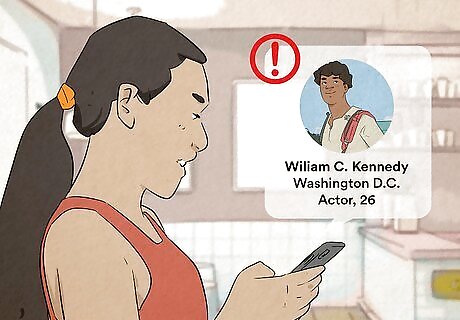
Fake profiles will make themselves look like a “perfect” person. Their profile is overly well written or they're over-exaggerating about all their strong points. If they look like a model, have a thriving career, and seem to have no flaws, they may be a work of fiction. Listen to your gut and notice if they seem too perfect. This could all be a glamor to get something out of you. A fake profile may claim to be famous, rich, or even royal. If you Google their name and nothing pops up, they’re definitely not a celebrity. Search for them on LinkedIn, Facebook, and Google for information on their career. If they’re telling the truth, chances are they have a LinkedIn account tied to their job.




















Comments
0 comment